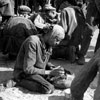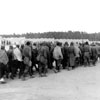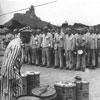Danillo Perluga / Ferluga 
Auschwitz no. 166470
Danillo Perluga was born on the 24th of January 1923 in Plewie, Yugoslavia. On the 5th of December Perluga was deported to Auschwitz from Flossenbürg concentration camp on a transport of prisoners of war.
The final record of him in camp documents is dated the 23rd of March 1944 from the ambulatorium, the camp hospital in the Männerlager (men's camp) in Auschwitz-Birkenau.
The Transport
On the 5th of December 1943 1,200 prisoners of war were sent from Flossenbürg concentration camp to Auschwitz. The majority of the prisoners were ill or disabled. 258 prisoners died on the train on the way to Flossenbürg. On arrival 34 Soviet prisoners of war received the numbers 11041RKG - 11074RKG and 827 prisoners received the numbers 166040 – 166866. 81 prisoners had already been prisoners in Auschwitz and had been sent from there to Flossenbürg on the 12th of March 1943. Upon their return to Auschwitz they received their previous camp numbers.
This transport had been intended to be sent to the gas chambers, but was instead quarantined in the Blla camp in Birkenau. On the orders of the camp commandant, the weakest prisoners were left outside the barracks to lie in the ice and snow. From time to time they were sprayed with cold water. During the night the the inmate in charge of the prisoners managed to bring 47 of them into the barracks. 32 prisoners died, among them one who had lain buried by the bodies of other prisoners and who died in the morning.
On the 18th of December 1943, 799 of the prisoners from this transport were still alive. On the 18th of January 1944, 751 of them were still alive. On the 18th of February 1944, only 393 of the prisoners from this transport remained alive.
Do you have any additional information about this person? Contact Yad Vashem.



